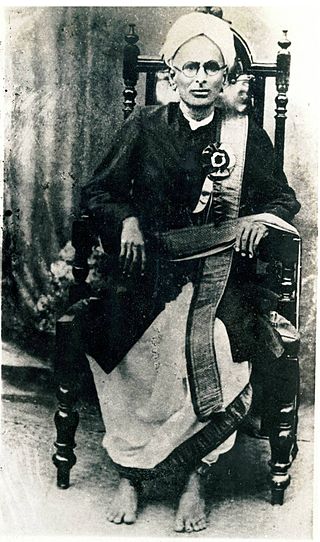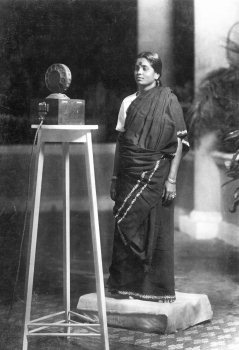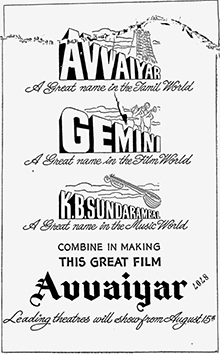See also
- Avva, a name
- Avva (film), a 2008 Indian film
Avvaiyar, Avviyar, or Auvaiyar is a Tamil title. It may refer to:

Tamil literature includes a collection of literary works that have come from a tradition spanning more than two thousand years. The oldest extant works show signs of maturity indicating an even longer period of evolution. Contributors to the Tamil literature are mainly from Tamil people from south India, including the land now comprising Tamil Nadu, Kerala, Eelam Tamils from Sri Lanka, as well as the Tamil diaspora.

The Tamil Sangams were three legendary gatherings of Tamil scholars and poets that, according to traditional Tamil accounts, occurred in the remote past. Scholars believe that these assemblies were originally known as kooṭam or "gathering," which was also a name for Madurai. Three assemblies are described. The legend has it that the first two were held in cities since "taken by the sea", the first being called Kapatapuram, and the third was held in the present-day city of Madurai.
Indian literature refers to the literature produced on the Indian subcontinent until 1947 and in the Republic of India thereafter. The Eighth Schedule to the Constitution of India has 22 officially recognised languages. Sahitya Akademi, India's highest literary body, also has 24 recognised literary languages.

The Sangam literature, historically known as 'the poetry of the noble ones', connotes the early classical Tamil literature and is the earliest known literature of South India. The Tamil tradition and legends link it to three legendary literary gatherings around Madurai and Kapāṭapuram: the first lasted over 4,440 years, the second over 3,700 years, and the third over 1,850 years. Scholars consider this Tamil tradition-based chronology as ahistorical and mythical. Most scholars suggest the historical Sangam literature era, also called the Sangam period, spanned from c. 300 BCE to 300 CE, while others variously place this early classical Tamil literature period a bit later and more narrowly but all before 300 CE. According to Kamil Zvelebil, a Tamil literature and history scholar, the most acceptable range for the Sangam literature is 100 BCE to 250 CE, based on the linguistic, prosodic and quasi-historic allusions within the texts and the colophons.

The Bhasha Kavisekhara Mahavidwan R. Raghava Iyengar (1870–1946) was known for critical scholarship and creative interpretation of literature.

Kodumudi Balambal Sundarambal was an Indian actress and singer from Erode district, Tamil Nadu. She performed in Tamil cinema and was referred to as the "Queen of the Indian stage." A political activist during the Indian independence movement, K.B. Sundarambal was the first film personality to enter a state legislature in India.

Avvaiyar is a 1953 Indian Tamil-language historical drama film directed by Kothamangalam Subbu, and produced by S. S. Vasan. The film stars K. B. Sundarambal as the title character. It was released on 15 August 1953.
South Indian cuisine includes the cuisines of the five southern states of India—Tamil Nadu, Andhra Pradesh, Karnataka, Kerala and Telangana—and the union territories of Lakshadweep, and Pondicherry. There are typically vegetarian and non-vegetarian dishes for all five states. Additionally, all regions have typical main dishes, snacks, light meals, desserts, and drinks that are well known in their respective region.
Sangam, may refer to:

Kothamangalam Subbu was an Indian poet, lyricist, author, actor and film director based in Tamil Nadu. He wrote the cult classic Tamil novel Thillana Mohanambal and was awarded the Padma Shri. According to novelist Ashokamitran's memoirs, Subbu functioned as the No. 2 of the giant Gemini Studios of Chennai, South India for over three decades and was a close associate of movie mogul S. S. Vasan, who established those studios and published the popular Tamil weekly Ananda Vikatan.
Nakkīraṉãr, sometimes spelled Nakkirar or Nakkiranar, was a post-Sangam era Tamil poet. He is credited with the devotional poem to the Hindu god Murugan in the Pattuppāṭṭu anthology, titled Tirumurukāṟṟuppaṭai. In the historic Tamil tradition, he is believed to have also authored a second poem in the Sangam collection titled Neṭunalvāṭai, as well as a detailed commentary on Iraiyanar Akapporul. However, according to the Tamil literature scholar Kamil Zvelebil, the Tirumurukāṟṟuppaṭai and the Neṭunalvāṭai were likely authored by two different Nakkirar, and Nakkīraṉãr and the older Nakkīrar were different individual. It is uncertain as to which century Nakkiranar lived, much like the chronology of the Sangam literature. Scholars variously place his works between 3rd and 8th century CE, with Zvelebil suggesting late classical.
Kapilar or Kabilar was the most prolific Tamil poet of the Sangam period. He alone contributed some 206 poems, or a little less than 10% of the entire Sangam-era classical corpus by 473 ancient poets. Held in high regard by other poets of the Sangam era, as well as the post-Sangam era, he is variously dated to have lived between c. 50–125 CE, or 140–200 CE.

Athiyamān Nedumān Añji was one of the most powerful Velir kings of the Sangam era who ruled the region called Mazhanadu, a part of ancient Kongu Nadu and the great dynasty called Chera Dynasty. A famous royal Athiyamān family dynasty was the contemporary and the patron of poet Avvaiyar of the Sangam period. Athiyamān who ruled over the Dharmapuri, Salem and surrounding areas with their capital at Tagadur. The most famous of their line were the father-son duo: Nedumān Añci and Elini. They were one of the Kadai ezhu vallal of arts and literature in ancient Tamil Nadu.
Yu Hsi is a Taiwanese Tamil poet and scholar who has translated the Tirukkural and the poems of Subramaniya Bharathi and poet Bharathidasan in Mandarin. He is the founder and president of the Tamil Sangam in Taiwan. He has received various awards, including awards from Seoul World Academy of Arts and Culture (2004), Thiruvalluvar Award (2014), and a felicitation from former President of India A. P. J. Abdul Kalam.
Tiruvalluva Malai is an anthology of ancient Tamil paeans containing fifty-five verses each attributed to different poets praising the ancient work of the Kural and its author Tiruvalluvar. With the poets' time spanning across centuries starting from around 1st century CE, the collection is believed to have reached its present form by 10th century CE. With the historical details of the ancient philosopher and his work remaining obscure, much of the legend on the Kural and Tiruvalluvar as they are known today are chiefly from this work. The collection also reveals the name of the author of the Kural text as 'Tiruvalluvar' for the first time, as Tiruvalluvar himself composed the Kural text centuries earlier without indicating his name anywhere in his work. Reminiscing this, E. S. Ariel, a French scholar of the 19th century, famously said of the Tirukkural thus: Ce livre sans nom, par un autre sans nom.
Lankappa Hanumanthaiah is an Indian poet, politician of the Indian National Congress and a member of the upper house of the Indian Parliament, the Rajya Sabha, from the state of Karnataka.
Karapuranathar temple is an ancient temple in Salem District of the Indian state of Tamil Nadu. The main deity is Shiva in lingasorubam. The temple is located near the west bank of Thirumanimutharu river at Uthamacholapuram. The lingam is suyambu. The name Karapuranathar is a compound of Karai ("riverbank"), Puram ("place"), and Nather ("Lord").

Avvaiyar was a Tamil poet who lived during the Sangam period and is said to have had cordial relations with the Tamil chieftains Vēl Pāri and Athiyamān. She wrote 59 poems in the Puṟanāṉūṟu. A plaque on a statue of the poet in Chennai suggests the first century BCE for her birthdate. The name Avvaiyar means a 'respectable good woman', hence a generic title; her personal name is not known.
Avvaiyar was a Tamil poet who lived during the period of Kambar and Ottakoothar during the reign of the Chola dynasty in the twelfth century. She is often imagined as an old and intelligent lady by Tamil people. Many poems and the Avvai Kural, comprising 310 kurals in 31 chapters, belong to this period. She is most widely known for her 'Aathichoodi', 'Kondrai Vendhan', 'Nalvazhi' and 'Moodhurai'. The name Avvaiyar means a 'respectable good woman', hence a generic title; her personal name is not known.